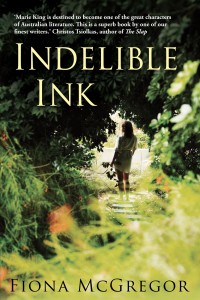 Published by Atlantic Books 14 June 2012
Published by Atlantic Books 14 June 2012
468pp, trade paperback, £12.99
Reviewed by Elsbeth Lindner
One swallow doesn’t make a summer and a small cluster of Australian novels concerned with social behaviour doesn’t entirely constitute a movement, nevertheless the recent preoccupation with middle-class mores in antipodean fiction is worthy of note. Racism, homophobia, adultery, difficult friends, poor parents, tattoos, sex among the elderly and infirm – from Helen Garner’s The Spare Room, via Christos Tsiolkas’s The Slap, the road leads on to Indelible Ink, Fiona McGregor’s third novel and winner of The Age’s Book of the Year Award.
McGregor’s book, like Tsiolkas’s, is long, borderline soapy and holds a mirror up to the conduct of people more or less like us. At its centre is the matriarch, Marie King, fifty-nine, divorced and finally obliged by the state of her finances to sell the lovely family house (with its stupendous garden) in an upmarket waterfront Sydney suburb that she received at the end of the marriage.
Marie has a history of boozing and it’s while drunk that she impulsively chooses to get a small, discreet tattoo of a rose. However, even when sober again, something about that outrageous, liberating, painful, exhilarating act drives her on for more. Marie discovers Rhys, a genius tattoo artist and lesbian mother with some wild friends, and together, over time, the two women apply a vast blue moth to Marie’s back, flames to her belly and vines to her chest and arms.
Typical of the wry pleasures of this indulgently readable novel are the responses Marie receives to her bizarre, new-found addiction to skin art. A recently-acquired, stylish lover is both repelled and excited; old friends express dismissive disapproval; even one of Marie’s three grown children responds by withdrawing.
Marie, though, is unrepentant. Having spent decades of her life trying to please everyone, holding home and family together while her ad-exec husband made money and slept with her best friends, she is hardly a rebel now, simply a single woman of a certain age starting to make some choices over and above family obligations.
So far, so pleasantly interesting. Add to this Marie’s children – gay horticulturalist Leon, nerdie divorced Clark who suddenly begins a heartstopping affair, and tough cookie Blanche – and you have enough meat for thirteen episodes if not a second series.
But that’s not all. McGregor’s canvas stretches further still, to observations on modern life in urban Australia: the wealth, the conspicuous consumption, the destruction of landscape, habitat and old architecture for the sake of ‘a home theatre, Gaggenau, five bathrooms, pool, six-car garage with wash bay, air-conditioned wine cellar’. Then there’s the ecological dimension. Parts of the novel take place during a drought, with bushfires burning around the city. ‘Australia has the fastest rate of species extinction in the world,’ we are reminded, and the Great Barrier Reef is at imminent risk.
Age, time, change, expectation, sex and above all money are the constant preoccupations and create fathomless fodder for McGregor’s relentless critique. Some of these targets are just too easy: the upscale dinner party, the plastic surgery, the opera philistinism. Elsewhere, the taste for epat-ing la bourgeoisie can raise a mental eyebrow, never more so than in the sex scene between two terminally-ill patients on a chemotherapy ward.
Nevertheless, the baggy-ness of the book and endless spinning of the storylines tends to work against the author’s incisiveness. Beyond Marie’s mild rebelliousness, there’s no driving plot and events simply ripple outward, often failing to achieve impact. The house is sold, Marie continues on her increasingly-difficult path to self-determination while her brood are last seen variously in mid-dilemma, as if a sequel were under consideration.
Bad behaviour tends to make good copy, though, and there’s plenty to enjoy in this epic as our Australian cousins are exposed in their vanities and unregenerate ways, many of them surely not so different from the home life of our own dear nation.
If in search of a solid summer read that will reassure and occasionally tickle liberal consciences, readers could do far worse than Indelible Ink.
